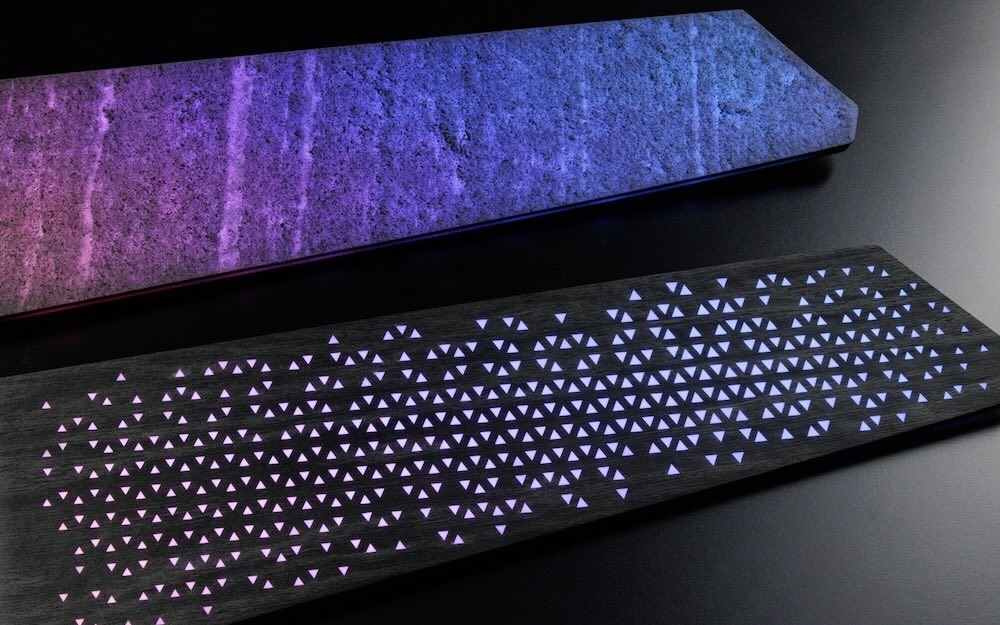Smart surfaces will change the way we design, create and experience the future. Our patented technology enables integrating illumination and intelligence within ultra-thin, smart surface structures and turns them into interactive experiences.

In-mold structural electronics (IMSE) technology helps us transform the way we look at our surrounding man-made environment.
This innovation liberates designers from structural limitations. Designers are now free to innovate and introduce electronic functions into new form factors. Smart surfaces can finally become commonplace.
This innovation makes surfaces thinner, lighter, and more durable while maintaining all the aesthetic and tactile qualities through plastic, wood, and other materials. The number of LEDs, energy usage, and the use of other materials is minimized, while still achieving superior lighting performance.
IMSE integrates printed circuitry and discrete electronic components within three-dimensional, molded plastics, creating a seamless structure. It combines aesthetics, mechanics, and electronics in the same piece.
What makes this innovation so great is that one can use existing off-the-shelf materials and mass-production manufacturing equipment in the process.
IMSE technology is also a two-time 2025 CES Innovation Awards® honoree. Read more.

This technology offers you the capabilities and the properties your products have been waiting for. Meet and exceed your customer needs across markets.

Style
01
Implement electrical functions anywhere you choose, in shapes and styles that support both your vision and create intuitive user interactions. Achieve elevated functionality on natural surfaces such as wood, glass, veneer, or leather.

Illuminate
02
IMSE enables multiple styles of illumination. Choose between single color or RGB in static and dynamic implementations from LEDs– all integrated within the ultra-thin IMSE structure. Applications include localized icon backlighting, light lines showing control levels, and large area decorative ambient illumination.

Touch
03
Offer improved control by placing individual capacitive sensors or sensor groups on curved surfaces. Place sliders on linear, circular, or other shapes.

Connect
04
Connect multiple devices wirelessly using printed antennas within the IMSE part. Bluetooth, NFC, and Wi-Fi technologies can be integrated with the close proximity of the antenna in the molded structures creating intelligent, digitized surfaces.

Sense
05
Activate functions with simple gestures using integrated proximity sensing.
As the design and manufacturing possibilites are endless, here are a few examples to spark your imagination.

As with any product, the needs of the end user are the biggest drivers in specifying the functionality, design, usability, and technical requirements of the solution. With the list of requirements ready, an IMSE design concept is created by combining verified IMSE materials and electronic components with proven IMSE building blocks, thus enabling rapid turnaround times.
Considerations affecting the selection of IMSE materials and building blocks include:
IMSE manufacturing has four main process steps. We combine cosmetics, structure, and function into single-piece, thin, and three-dimensional designs, reducing assembly and integration challenges compared with conventional electronics.

Printing
01
Conductive patterns and, optionally, a printed decoration layer are added to a substrate (for instance, a plastic film) using methods such as screen printing.

Surface Mounting
02
Electronic components are mounted on the flat substrate using standard high-speed pick-and-place (SMT) equipment. Components are attached to the substrate using conductive and structural adhesives.

Thermoforming
03
The substrate with electronics is formed into its desired 3D shape. When designed following TactoTek® guidelines and verified material stacks, the part maintains mechanical and electrical system integrity through the forming process.

Molding
04
The formed electronics and cosmetic substrates are overmolded with, for instance, injection molding. The output is a solid, thin, single-piece IMSE structure with encapsulated electronics.
